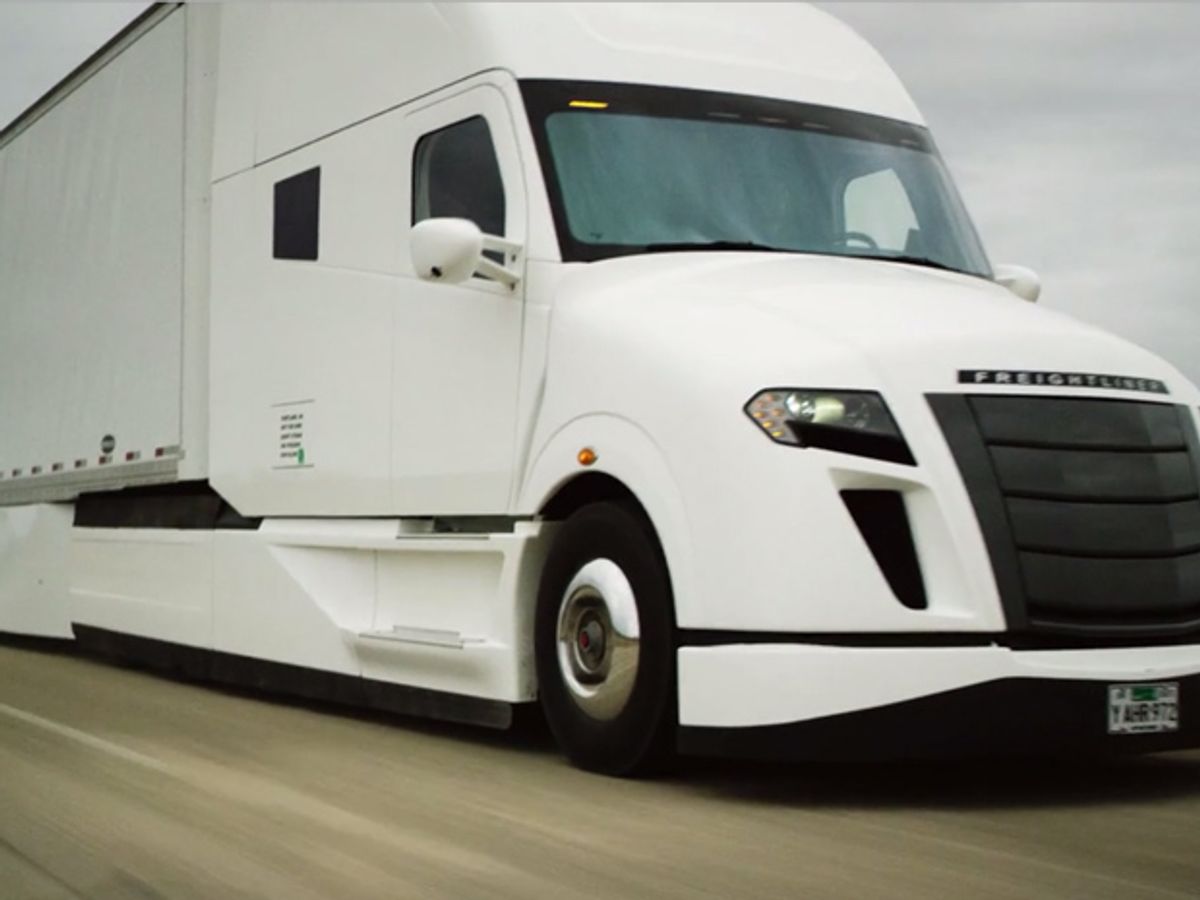While we tend to focus on smart cars around here, smart trucks are just as important. Arguably, they’re even more important, because while your car spends most of its life not being used, semi trucks spend most of their lives actually being driven, bringing you (and everyone else) all kinds of important goods. Numbers I found from 2006 suggest that semi trucks average between 72,000 and 161,000 kilometers per year. With that much driving time, even small increases in efficiency can make a huge difference.
Freightliner, which has been building trucks for something like 70 years, is interested in much more than small increases in efficiency. Last week, the company showed off its “SuperTruck” prototype, which is a ludicrous 115 percent more efficient than a standard semi truck, thanks to solar panels, waste heat harvesters, and some wicked aerodynamics.
The SuperTruck program was actually the idea of the U.S. Department of Energy, which co-sponsored it along with four major truck manufacturers. The DOE was looking for a 50-percent improvement in freight efficiency, but Freightliner’s SuperTruck rolled right on over that 50 percent mark like a truck rolling over 50 percent of something.
Step one was to make the SuperTruck as aerodynamic as possible. Articulating skirts plugged up gaps between the truck and the trailer and around the wheels. On the highway, the entire vehicle hunkers down to make itself extra slippery. The grille closes up whenever the truck is running cool enough, and even the side mirrors were redesigned to be just as aerodynamic as the rest of the truck.
Next, both truck and trailer were put on a diet to minimize the amount of energy that the truck has to expend just hauling itself around. Components and systems were optimized, minimized, and lightened; even the frame was made more svelte. Overall, SuperTruck is about 320 kilometers lighter than a normal truck. At the same time, friction in every moving part of the truck, from wheels to engine, was aggressively minimized.
So far, these improvements are all pretty obvious, but Freightliner was willing to try some completely new things as well. They gave the truck a waste heat harvesting system; it extracts thermal energy from the engine exhaust (like a little steam engine) and then sends it back into the hybrid powertrain. The top of the trailer is covered in solar panels, and on a sunny day, the trailer’s air conditioning system can use solar power to run continuously without the truck even needing to be turned on. The truck got some extra smarts, too: it uses GPS to analyze the road ahead, and then optimizes its speed and shifting for upcoming terrain.
During testing on public roads in Texas, the loaded up SuperTruck managed 12.2 miles per gallon (19.27 liters per 100 kilometers) at 65 miles per hour (105 km/h). This sounds awful, and relative to a car, it is. But SuperTruck (with cargo) weighs 29,500 kilograms (65,000 lbs.) and it’s more than twice as efficient as a typical semi truck, potentially saving nearly 38,000 liters of diesel a year.

The SuperTruck press release ends with the comment that “the SuperTruck team discovered that some of these components, due to regulatory or economic barriers, may not be commercially viable in the near future.” This is always the problem with amazing prototypes: in the short to medium term, it’s unfortunately cheaper much of the time to just keep on making less efficient vehicles, because the economic benefit to the end user can’t compete with the up-front cost of a vehicle that has, say, a waste heat recovery system plus a bunch of solar panels built in. This is a shame, but sooner or later, the economics will make sense, and then? When all trucks have these features, none of them will be SuperTrucks.
Evan Ackerman is a senior editor at IEEE Spectrum. Since 2007, he has written over 6,000 articles on robotics and technology. He has a degree in Martian geology and is excellent at playing bagpipes.



